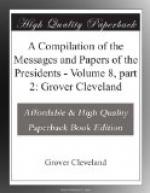Gentlemen of the Senate:
Application having been made to me to permit a treaty to be held with the Seneca Nation of Indians to effect the purchase of a parcel of their land under a preemption right derived from the State of Massachusetts and situated within the State of New York, and it appearing to me reasonable that such opportunity should be afforded, provided the negotiation shall be conducted at the expense of the applicant, and at the desire and with the consent of the Indians, always considering these as prerequisites, I now nominate Isaac Smith to be a commissioner to hold a treaty with the Seneca Nation for the aforesaid purpose.
GEORGE WASHINGTON.
VETO MESSAGE.
UNITED STATES, February 28, 1797.
Gentlemen of the House of Representatives:
Having maturely considered the bill to alter and amend an act entitled “An act to ascertain and fix the military establishment of the United States,” which was presented to me on the 22d day of this month, I now return it to the House of Representatives, in which it originated, with my objections:
First. If the bill passes into a law, the two companies of light dragoons will be from that moment legally out of service, though they will afterwards continue actually in service; and for their services during this interval, namely, from the time of legal to the time of actual discharge, it will not be lawful to pay them, unless some future provision be made by law. Though they may be discharged at the pleasure of Congress, in justice they ought to receive their pay, not only to the time of passing the law, but at least to the time of their actual discharge.
Secondly. It will be inconvenient and injurious to the public to dismiss the light dragoons as soon as notice of the law can be conveyed to them, one of the companies having been lately destined to a necessary and important service.
Thirdly. The companies of light dragoons consist of 126 noncommissioned officers and privates, who are bound to serve as dismounted dragoons when ordered so to do. They have received in bounties about $2,000. One of them is completely equipped, and above half of the noncommissioned officers and privates have yet to serve more than one-third of the time of their enlistment; and besides, there will in the course of the year be a considerable deficiency in the complement of infantry intended to be continued. Under these circumstances, to discharge the dragoons does not seem to comport with economy.
Fourthly. It is generally agreed that some cavalry, either militia or regular, will be necessary; and according to the best information I have been able to obtain, it is my opinion that the latter will be less expensive and more useful than the former in preserving peace between the frontier settlers and the Indians, and therefore a part of the military establishment should consist of cavalry.




